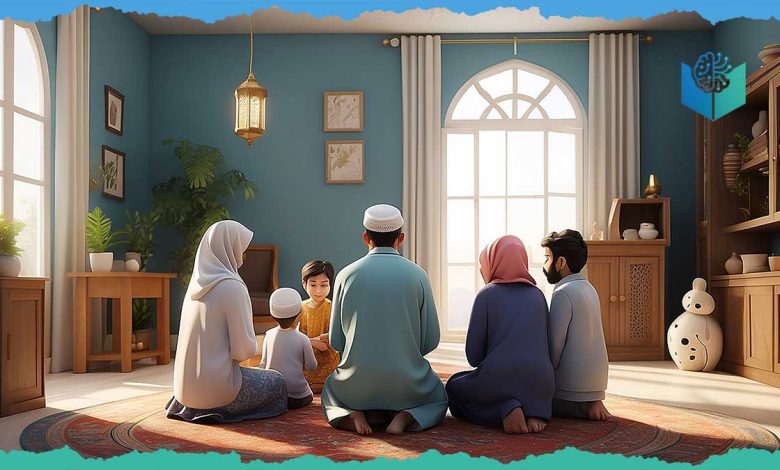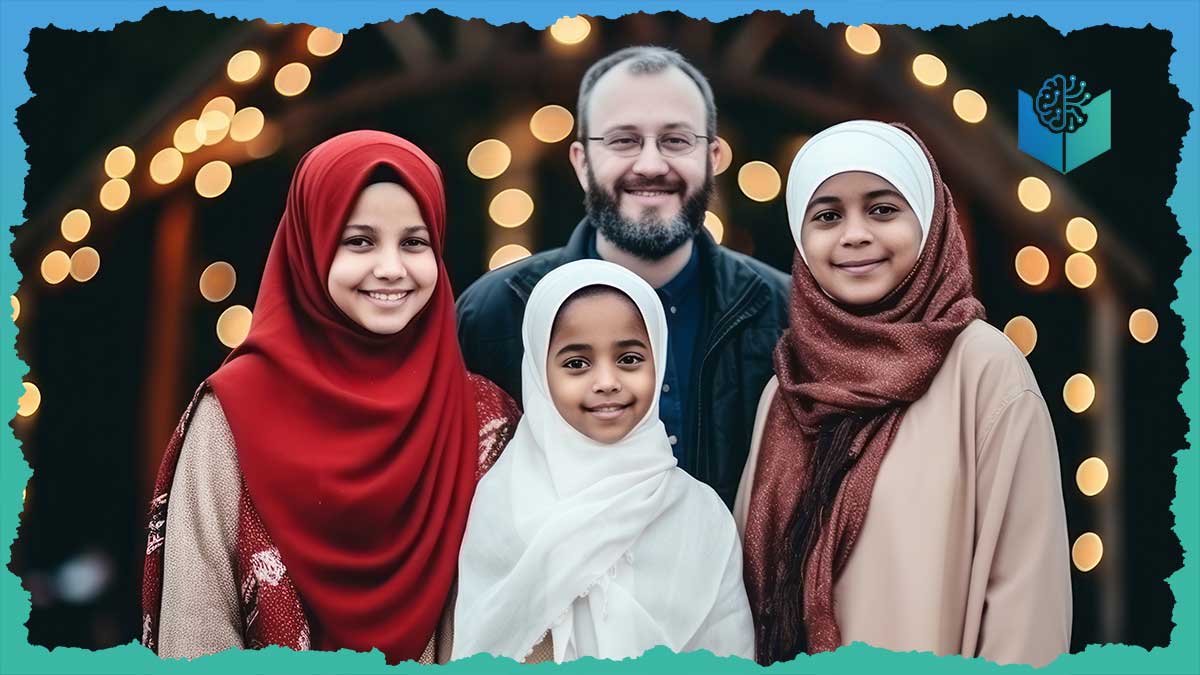Family Values in the Quran

The family unit is the cornerstone of society in Islam, deeply revered and protected by divine Family in Islam isn’t just a social idea; it’s a sacred setup by Allah that builds strong communities and good spiritual lives. guidance. The Quran provides comprehensive Islamic family values, offering timeless principles for building strong, compassionate, and harmonious households. From the sacred bond of marriage to the profound respect for elders and the importance of kinship, these Quranic teachings on family lay out a clear roadmap for every lifestyle muslim aiming for both worldly success and spiritual fulfillment. This article explores the core tenets of family values as presented in the Quran, highlighting how these divine directives foster successful Muslim marriage and a harmonious home.
Within Quranic guidance, the importance of family in Islam is repeatedly emphasized as the foundation upon which faith, morality, and society are built. These teachings also shape a distinct islamic family culture that balances rights, responsibilities, mercy, and justice.
Foundations of the Muslim Family
At the heart of Family in Islam lies the institution of marriage, seen as more than just a contract, but as a sacred promise (mithaq) between a man and a woman.
Marriage represents one of the primary types of family in Islam, forming the nucleus from which wider family relationships and responsibilities emerge.
The Sacred Bond of Marriage
Marriage in Islam is the only legitimate way to start a family. It’s built on principles of love, mercy, and mutual respect, aiming to provide companionship, procreation, and spiritual solace.
Love and Mercy (Mawaddah wa Rahmah): The Quran emphasizes that marriage is a sign of Allah’s power, infused with profound emotions of love and mercy.
“And of His signs is that He created for you from yourselves mates that you may find tranquility in them; and He placed between you affection and mercy. Indeed there are signs for people who give thought.” (Quran 30:21).
This verse beautifully shows the deep emotional and spiritual connection in a successful Muslim marriage, proving it’s far more than just physical attraction and central to the importance of family in Islam.
Mutual Rights and Responsibilities: Both spouses have rights and responsibilities towards each other, ensuring balance and fairness within the relationship. The Quran states:
“And due to them [the wives] is like that which is due from them in accordance with what is reasonable.” (Quran 2:228).
This principle promotes equality and justice, forming a strong basis for Quranic teachings on family. Husbands are enjoined to treat their wives with kindness and provide for them, while wives are expected to protect their husband’s honor and property. These mutual obligations represent the core rights of family in Islam and preserve harmony within the household.

Resolving Conflicts and Seeking Harmony
Even in the strongest relationships, disagreements can arise. The Quranic teachings on family provide guidance for resolving conflicts with wisdom and compassion.
Patience and Forbearance: Spouses are encouraged to exercise patience and understanding with each other.
“And live with them in kindness. For if you dislike them, perhaps you dislike a thing and Allah makes therein much good.” (Quran 4:19).
This verse reinforces emotional resilience as part of a healthy islamic family culture.
Seeking Reconciliation: In cases of severe discord, the Quran suggests involving mediators from both families to help resolve issues before they escalate.
“And if you fear dissension between the two, send an arbitrator from his people and an arbitrator from her people. If they both desire reconciliation, Allah will cause it between them. Indeed, Allah is ever Knowing and Acquainted.” (Quran 4:35).
This structured approach underscores the importance of preserving the family unit and reflects the broader importance of family in Islam hadith, which also stresses reconciliation and mercy within households.
Respect, Obedience, and Kinship Ties
Beyond the marital bond, Islamic family values place immense importance on the hierarchical yet compassionate relationships between parents and children, and the broader network of kinship.
These relationships form extended types of family in Islam, including parents, children, grandparents, and relatives, all connected through mutual obligation.
Respect for Parents in the Quran
The duty to honor and obey parents is one of the most emphasized Quranic teachings on family, second only to the worship of Allah.
Exalted Status of Parents: The Quran repeatedly commands kindness, respect, and obedience to parents, especially as they age.
“And your Lord has decreed that you not worship except Him, and to parents, good treatment. Whether one or both of them reach old age [while with] you, say not to them [even] ‘uff,’ and do not repel them but speak to them a noble word. And lower to them the wing of humility out of mercy and say, ‘My Lord, have mercy upon them as they nurtured me when I was small.'” (Quran 17:23-24).
This injunction is incredibly powerful, prohibiting even the slightest expression of impatience or disrespect and highlighting the importance of family in Islam at every stage of life.
Gratitude and Prayer: Children are reminded of the immense sacrifices parents make in raising them and are encouraged to pray for them. This deepens the bonds and ensures the continuity of blessings. Respect for parents in the Quran is a vital part of living as a good Muslim and aligns with the importance of family in Islam hadith, which further reinforces obedience and gratitude toward parents.

Nurturing Children
Children are considered a blessing and a trust from Allah, and parents have a profound responsibility for their upbringing and education.
Holistic Development: Parents are enjoined to raise children with sound moral character, instilling Islamic values, teaching them about their faith, and providing for their physical, emotional, and intellectual needs.
“O you who have believed, protect yourselves and your families from a Fire whose fuel is people and stones…” (Quran 66:6).
This verse highlights the spiritual dimension of parenting and reinforces the rights of family in Islam, particularly the rights of children to guidance and care.
Justice and Fairness: Parents are encouraged to treat all their children justly and fairly, avoiding favoritism, which can lead to resentment and discord. This promotes a harmonious home rooted in Islamic justice.
Kinship Ties in Islam
Beyond the immediate family, Islam places great emphasis on maintaining and strengthening ties with extended family members (kinship ties or silat ar-rahim).
Maintaining Connections: Visiting relatives, inquiring about their well-being, and assisting them in times of need are highly encouraged acts of worship.
“And give the relative his right, and [also] the poor and the traveler, and do not spend wastefully.” (Quran 17:26).
Breaking kinship ties in Islam is severely condemned, as these relationships are essential to the islamic family culture.
Broadening the Circle of Compassion: This emphasis on extended family fosters a strong social support network and reinforces community bonds, contributing to the overall well-being of society. It reflects a comprehensive understanding of human relationships in about Islam.
The Family as a Pillar of Society
The robust Islamic family values outlined in the Quran are not just for individual benefit; they are fundamental to building a moral and stable society.
Cultivating a Harmonious Home: A home built on Quranic principles for a harmonious home becomes a haven of peace, love, and spiritual growth, reflecting the deep importance of family in Islam.
Mutual Consultation (Shura): The Quran encourages consultation within the family, especially on important decisions, empowering all members and fostering a sense of shared responsibility.
Patience and Forgiveness: Practicing patience, understanding, and forgiveness within the family helps overcome challenges and strengthens bonds.
Leading by Example: Parents are encouraged to be role models, embodying the values they wish to instill in their children. This complete approach helps create a truly harmonious home.

The Societal Impact of Strong Families
When families adhere to these divine principles, the benefits extend far beyond the household, impacting the entire community.
Moral Upbringing: Strong families raise morally upright individuals, who then contribute positively to society, reducing crime and social ills.
Social Cohesion: The emphasis on kinship ties in Islam and mutual support among relatives creates a resilient social fabric grounded in shared responsibility.
Continuity of Faith: Families serve as the primary educators of faith, transmitting Islamic family values and Quranic teachings on family from one generation to the next, ensuring the preservation of religious identity and practice.
Conclusion
The Family Values in the Quran offer a timeless blueprint for constructing healthy, resilient, and spiritually fulfilling family units. By embracing these divine principles from the sacred covenant of marriage and mutual respect between spouses, to the profound respect for parents and the crucial emphasis on kinship ties Muslims can build homes that are not only sources of tranquility and love but also vital contributors to a just and compassionate society. These Quranic teachings on family truly illuminate the comprehensive guidance found in the Quran for every aspect of a Muslim lifestyle muslim, offering profound insights into about Islam and its holistic vision for humanity.
Q&A
What is the importance of family in the Quran?
The Quran views family as the foundational unit of society and a sacred institution ordained by Allah. It emphasizes love, mercy, mutual rights, and the preservation of strong family bonds.
What are the beliefs of family in Islam?
In Islam, family is a divinely established system based on marriage, compassion, responsibility, and respect. These beliefs shape the core types of family in Islam and define family roles clearly.
What is the significance of family in Islam?
Family in Islam is central to faith, morality, and social stability. It nurtures spiritual growth, preserves values, and fulfills the rights of family in Islam across generations.
🔗 Building Strong Family Bonds Through Islam
https://ayatalquran.com/building-strong-family-bonds-through-islam/
🔗 Islamic Family Life: Insights from the Quran on Family Values
https://nooracademy.com/insights-from-quran-on-family-values/
🔗 What the Quran Says About Family?
https://quranica.com/articles/what-the-quran-says-about-family/
🔗 Values – al-nasr.org
https://al-nasr.org/values
🔗 Structure of Muslim Family
https://al-nasr.org/structure
🔗 Family and Social Responsibilities in Islam
https://thequran.home.blog/2025/03/18/family-and-social-responsibilities-in-islam/
🔗 Forbidden Marriages in Islam
https://qurangallery.app/by-ayah/prohibited-marriages-mahram-relations-surah-an-nisa-4-23-islamic-law





